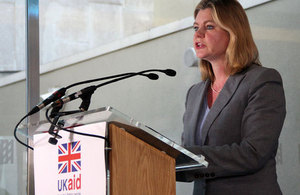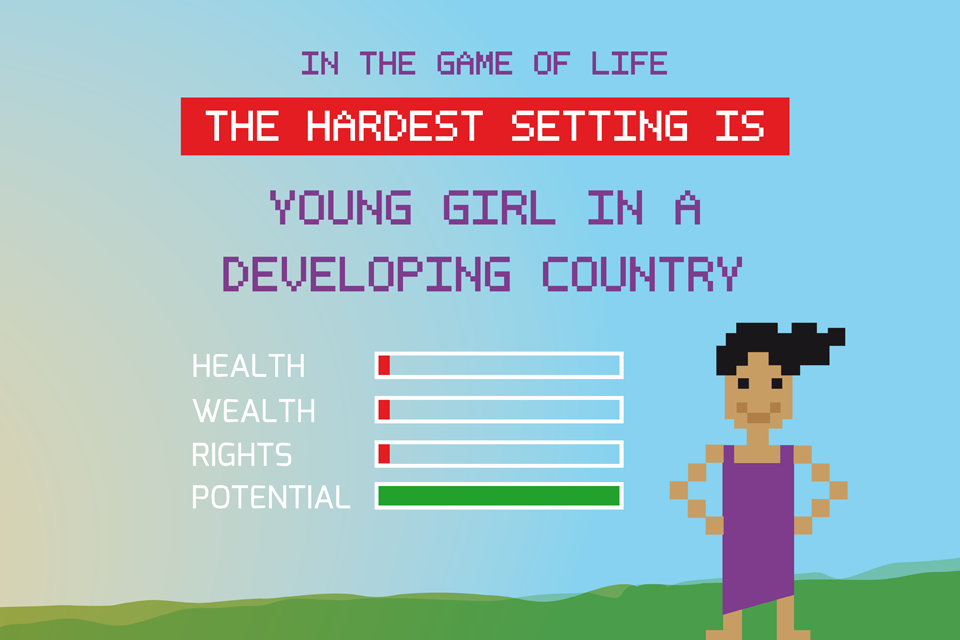Greening: it’s time to break the silence on early and forced marriage
Ahead of International Women's Day, International Development Secretary says global action must be taken to stop girls being forced into marriage.

International Development Secretary Justine Greening speaking at the Transform Her Future event in London. Picture: Lindsay Mgbor/DFID
Global action must be taken to stop girls being forced into marriage, International Development Secretary Justine Greening said today, ahead of International Women’s Day.
In a keynote speech hosted by Plan UK, Girls Not Brides and the Gender and Development Network, Justine Greening said it was time to break the silence on Early and Forced Marriage (EFM) and replicate recent work to put Female Genital Mutilation (FGM) on the global agenda.
One in 3 girls in the developing world will be married by their eighteenth birthday and 1 in 9 is married by age 15, some will be as young as 8 years old. These girls often face immediate pressure to have children, are subjected to violence, drop out of education and are at greater risk of HIV and other sexually transmitted diseases. According to current trends an estimated 220 million more girls will have been married as children by 2030.
Justine Greening said:
The first step to tackling EFM and FGM is to make sure the international community is speaking with one voice. Every year 14 million girls and women are forced to marry early or against their will. When a girl cannot decide for herself when to marry and have children, it’s not just a tragedy for her, it’s a disaster for development.
It’s time to break the silence of early and forced marriage and recognise that it is exploitation as serious as any other form of child abuse.
Tanya Barron CEO of Plan UK said:
Early and forced marriage drives girls into a cycle of poverty, ill health, illiteracy and powerlessness. It’s most prevalent where poverty is rife and where education and health systems are poor.
But as well as economic empowerment, early and forced marriage is first and foremost an issue of rights and gender inequality. It is through empowering girls, boys and community leaders to protect and advocate for girls’ rights that we will see an end to this practice.
Lakshmi Sundaram Global Coordinator of Girls Not Brides said:
Child brides are among the world’s most voiceless and isolated people. We’re pleased to see that DFID is helping to bring attention to child marriage, a problem once overlooked on the international stage.
We know what it will take to end child marriage, but change won’t happen overnight. Successful efforts must be grounded in the realities of the places where child marriage is common. That is why we need to support the community-based organisations at the forefront of this issue, working with parents and communities to create a better future for their daughters. It is only by working in partnership over the long term that we will be able to reach all those girls who are being held back by child marriage.

The hardest setting in the game of life? Young girl in a developing country: your health, wealth and rights are rock-bottom. But your potential is sky-high! Inforgraphic: DFID
The Department for International Development (DFID) works directly with communities where early and forced marriage is prevalent. This includes a £10 million programme in Ethiopia which aims to delay marriage for up to 200,000 girls.
Read Justine Greening’s speech at the Transfrom Her Future event.
Notes to editors
-
DFID is supporting the growing movement within Africa to end FGM and has established a consortium of leading anti-FGM campaigners to support activists across Africa raising awareness of the pain and suffering FGM causes and showing that we can end the practice
-
Plan is a global children’s charity. It works with children in the world’s poorest countries to help them build a better future. Plan’s ‘Because I am a Girl’ campaign aims to highlight the plight and potential of the world’s poorest girls by securing them an education and support
-
Girls Not Brides is a global partnership of over 300 civil society organisations across more than 50 countries working to end child marriage @GirlsNotBrides
-
The Gender and Development Network is a diverse, effective and inclusive membership network made up of leading UK-based non-governmental organisations’ (NGO) staff, practitioners, consultants and academics working on gender, development and women’s rights issues
General media queries (24 hours)
Email mediateam@dfid.gov.uk
Telephone 020 7023 0600
If you have an urgent media query, please email the DFID Media Team on mediateam@dfid.gov.uk in the first instance and we will respond as soon as possible.
Updates to this page
-
Addition of link to speech
-
First published.